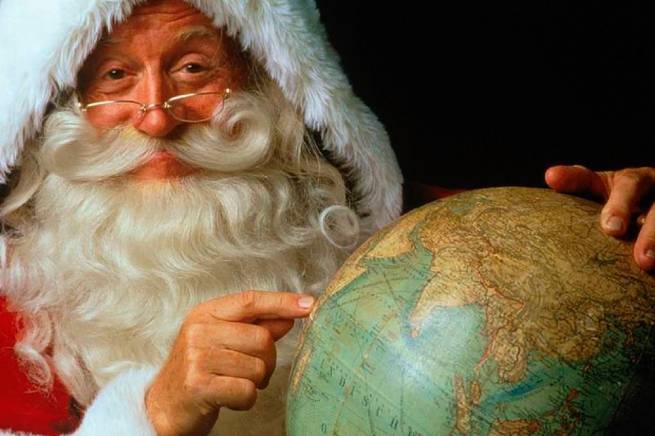Each country has its own national New Year traditions. Residents of other states, they may seem ridiculous, and sometimes exotic.
For many people, the only well-known tradition for the New Year is to make and write down a wish, burn a piece of paper with it to the chiming clock and pour the ashes into your glass of champagne. Naturally, it must be drunk to the bottom – otherwise it will not come true. But most people think it’s pretty ridiculous. However, each country has its own strange traditions, and to many they may seem even stranger. Judge for yourself.
Japan. On New Year’s Eve, the inhabitants of the country hang a small rake on the wall. But only handmade and painted! They are deeply convinced that a unique and brightly decorated garden tool will help “rake in luck” in the near future.
Germany. Compared to the traditional Russian film Irony of Fate, or Enjoy Your Bath! the 1963 comedy sketch “Dinner for One” is only 11 minutes long. But they watch it with the same regular frequency, without fail – on New Year’s Eve. An English-produced black-and-white tape is the most broadcast television program in the history of German television. The plot is simple: an elderly Miss Sophie, her butler and a party in honor of the 90th birthday of the old lady. Sophie is the hostess of the evening, and the butler takes on the roles of all her dead friends. In Germany, “The Ninetieth Birthday, or Dinner for One” is shown on the last day of the outgoing year, and in Switzerland – on the first day of the coming year, it has also become a tradition there.
Denmark. Residents of the country break dishes at the front doors of friends, relatives and just neighbors. According to legend, the happiest in the new year will be the one at whose door the largest pile of fragments. Yes, starting on January 1 with cleaning the shards, and even after the festive feast, is another occupation …
Greece: a wonderful tradition of the “first leg” and pomegranates at the doorstep on New Year’s Eve. The first person who crosses the threshold of the house in the new year will determine what he will become for the whole family. Children are often chosen as the first “visitor” – they say a wish and break the symbol of abundance, a pomegranate, at the front door. After that, for sure, happiness, love and prosperity will reign in the house all year long. Yes, and money is not measured – the more pomegranate seeds scatter around, the more money the coming year will become.
Latin America: it is important to choose the right color of underwear in which you celebrate the New Year. This custom prevails in Bolivia, Brazil, Mexico. Yellow symbolizes wealth and good luck, red – romance, white – excellent health. But black panties are a bad omen. Moreover, underwear, before midnight, must be turned inside out, and after the New Year, it must be put on correctly.
Ireland famous for the tradition of “bread” throws. Its emotional residents believe in all evil spirits – ghosts, spirits and the like. To get rid of evil spirits, it is necessary to bite off three times from the ritual baking with cumin – seed cake, and throw the rest out the door. Such actions are designed to expel the guests of the other world from the house. In some regions of the country, the custom is “simplified” – it is quite enough to knock on the corner of the house with a baked loaf. But you need to do this three times – it is in the figure that the whole meaning is hidden, it symbolizes the Holy Trinity. And the guests also give the hosts a piece of charcoal – so that prosperity reigns in the family in the new year.
Philippines. The circle is a symbol of prosperity in many cultures, including the Philippines. Therefore, on New Year’s Eve, everything should be round – fruits, bread and even peas on a festive outfit. Round coins are indispensable elements of New Year’s decor, and a few are worth putting in your pocket.
Peru. On New Year’s Eve, mass fights have long become a ritual. According to legend, on the Takanakuy holiday, which originates from the Incas, everyone can challenge the one who offended him last year. Having resolved the conflict with the help of fists, the rivals enter the new year peacefully and “do not hold a stone in their bosoms.” This traditional ceremony has long turned into a show that attracts tourists.
Romania. Bear dances, the inhabitants of the country believe, will help to leave all sorrows and sorrows in the past. On the eve of the New Year, a bear parade is held in the Romanian gypsy communities. From young to old, they dress in bearskins and dance on the city streets, seeing off all the bad things that happened last year. An ancient pagan tradition says that a house that a bear looks into will not know grief in the coming year.
And there are countries in which they do not celebrate the New Year at all in our usual sense.







More Stories
Tap & Pay system on express bus routes from/to Athens Airport
Jennifer Aniston: 9 to 5 remake
More than 2 million taxpayers are at risk of seizure of accounts and assets